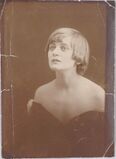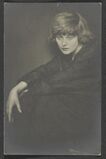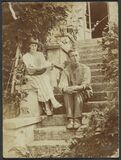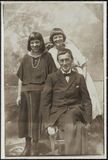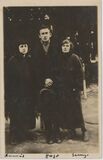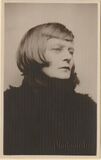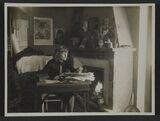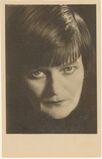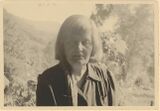Emmy Hennings
 Emmy Hennings, Zürich, c.1921-1922. Photo: Hanns Holdt. [17] [18] | |
| Web | Dada Companion, Wikipedia |
|---|---|
Emmy Hennings (born Emma Maria Cordsen, 17 January 1885, Flensburg – 10 August 1948, Sorengo near Lugano) was a writer, actress and performer. She is one of the founders of the Dada movement.
Life and work[edit]
In 1913 Emmy Hennings (b. 1885 Flensburg) settled in Munich, where she became an intimate of the expressionist poets, playwrights, and novelists who populared Munich's seedy Bohemian quarter and frequented the Café Simplizissimus singing popular cabaret songs and reciting her own poems as well as those written by friends. One of Hennings, lovers in Munich was Hugo Ball, whom she had met while singing at the Café Simpl, and whom she would later marry.
In November 1914 Hennings joined Ball in Berlin, where she sang in a variety of restaurants and worked as an artist's model. To escape the increasing nationalism Ball and Hennings left Berlin for Zurich in May 1915. They arrived completely destitute and lived on the assistance of Hennings' literary friends until they found work with a vaudeville troupe. In 1916 the decided to start their own cabaret and on 5 February 1916 they opened the Cabarer Voltaire.
At the Cabaret, Hennings was one of the star attractions. Her wide repertoire included popular songs from Denmark, Paris, and Berlin, Chinese ballads, folk songs and her own poems and poetry written by other dadaists. Hennings' charisma as a performer and her previous cabaret experience contributed to the success of the venture.
Hennings poems dealt with her life outside the safety provided by bourgeois propriety. Addressing such expressionist themes as loneliness, ecstasy, captivity, illness, and death. Hennings was able to reflect on her experiences: certain places - prisons, hospitals, cabarets, and the streets - and afflictions - prostitution and drug addiction - recur again and again. Several of her poems, though not strictly dadaist in form or content, were published in Dada magazines.
Hennings rarely discussed her early life subsequent to her intense conversion to Catholicism in 1920, preferring instead to emphasize her piety and her devotion to Ball. After he died in 1927, she provided his life with a similar trajectory consistently portraying his intellectualism as a search for the absolute, which found its rightful home in Catholicism, and slighting his time with Dada as a youthful misadventure. Emmy Hennings died in Tessin in 1948. (Source)
Portraits[edit]
Emmy Hennings, Munich, c.1912. [1]
Emmy Hennings, c.1912-1913. [2]
Emmy Hennings, 1913. [3]
Emmy Hennings, c.1917-1918. [4]
Emmy Hennings and Hugo Ball, Agnuzzo, 1921. [7]
Annemie Schütt-Hennings, Hugo Ball and Emmy Hennings, Albori, 1925. [8]
Annemie Schütt-Hennings, Hugo Ball and Emmy Hennings, Salerno, 1926. [9]
Emmy Hennings, Agnuzzo, c.1930. [12]
Writings, publications[edit]
- Die letzte Freude. Gedichte, Leipzig: Kurt Wolff Verlag, 1913, 15 pp, KHZ, IDA. (German)
- "La última alegría", in Hennings, La última alegría, ed. José Antonio Sarmiento, trans. José Luis Reina Palazón, Cuenca: Ediciones de la Universidad de Castilla-La Mancha, 2018. (Spanish)
- Gefängnis, Berlin: Erich Reiss, 1919. Novel. (German)
- Cárcel; seguido del poemario Estrofas del éter, trans. Fernando González Viñas, Sevilla: El Paseo, 2018, 174+[16] pp. (Spanish)
- Prigione, trans. Marco Federici Solari, Rome: L'Orma, 2019, 158 pp. (Italian)
- Das Brandmal. Ein Tagebuch, Berlin: Erich Reiß Verlag, 1920, 326 pp, KHZ, IDA. Diary. (German)
- El estigma: un diario, trans. & notes Fernando González Viñas, Sevilla: El Paseo, 2019, 282 pp. (Spanish)
- Branded, trans. & edited Katharina Rout, Guelph: Broadview Press, 2022, 294 pp. (English)
- Helle Nacht. Gedichte, Berlin: Reiß, 1922. (German)
- Das ewige Lied, Berlin: Reiß, 1923. (German)
- Der Gang zur Liebe. Ein Buch von Städten, Kirchen und Heiligen, Munich: Kösel & Pustet, 1926. (German)
- editor, Hugo Ball. Sein Leben in Briefen und Gedichten, forew. Hermann Hesse, Berlin: Fischer, 1929, 312 pp. (German)
- Hugo Balls Weg zu Gott: ein Buch der Erinnerung, Munich: Kösel & Pustet, 1931, 189 pp. (German)
- Das flüchtige Spiel. Wege und Umwege einer Frau, Einsiedeln: Benziger, 1940, 288 pp; repr., Frankfurt am Main: Suhrkamp, 1988, 187 pp. (German)
- Helga speelt het leven, Tilburg: Bergmans, 1946, 282 pp. (Dutch)
- Ruf und Echo: mein Leben mit Hugo Ball, Einsiedeln: Benziger, 1953, 291 pp; repr., afterw. Christian Döring, Frankfurt am Main: Suhrkamp, 1990, 313 pp. Autobiography. (German)
- Emmy Hennings Dada, eds. Christa Baumberger and Nicola Behrmann, Zürich: Scheidegger & Spiess, 2015, 236 pp. [19] (German)
Literature[edit]
- Thomas F. Rugh, "Emmy Hennings and the Emergence of Zurich Dada", Woman's Art Journal 2:1, Spring-Summer 1981, pp 1-6. (English)
- Renée Riese Hubert, "Zurich Dada and Its Artist Couples", in Women in Dada: Essays on Sex, Gender, and Identity, ed. Naomi Sawelson-Gorse, MIT Press, 1998, pp 516-545. (English)
- René Gass, Emmy Ball-Hennings: Wege und Umwege zum Paradies: Biographie, Zürich: Pendo, 1998. (German)
- Tom Sandqvist, Kärlek och dada: Hugo Ball och Emmy Hennings, Stockholm: Brutus Östlings Bokförlag Symposion, 1998, 367 pp. (Swedish)
- Erika Süllwold, Das gezeichnete und ausgezeichnete Subjekt. Kritik der Moderne bei Emmy Hennings und Hugo Ball, Stuttgart: J.B. Metzler, 1999, 325 pp. (German)
- Bärbel Reetz, Emmy Ball-Hennings, Leben im Vielleicht; eine Biographie, Frankfurt am Main: Suhrkamp, 2001. (German)
- Emmy Ball-Hennings: Muse, Diseuse, Dichterin, eds. Regina Bucher and Bernhard Echte, Wädenswil: Nimbus, 2006, 87 pp; rev.ed., 2015, 87 pp. (German)
- Emmy Ball-Hennings: musa, diseuse, poetessa, trans. Lucilla Janssen and Manuela Cattaneo, Montagnola: Fondazione Hermann Hesse, 2006, 73 pp. Catalogue. (Italian)
- Ruth Hemus, "Emmy Hennings", in Hemus, Dada's Women, Yale University Press, 2009, pp 17-52. (English)
- Paula K. Kamenish, "Emmy Hennings: From Cabaret Singer to the First Mama of Dada", in Kamenish, Mamas of Dada: Women of the European Avant-Garde, University of South Carolina Press, 2015. [20]. (English)
- Bärbel Reetz, Das Paradies war für uns. Emmy Ball-Hennings und Hugo Ball, Berlin: Insel, 2015, 477 pp. (German)
- Alfred Sobel, „Gute Ehen werden in der Hölle geschlossen“. Das wilde Leben des Künstlerpaares Hugo Ball und Emmy Hennings zwischen Dadaismus und Glaube, Kißlegg: Fe-Medienverlag, 2015. (German)
- Eveline Hasler, Und werde immer Ihr Freund sein. Hermann Hesse, Emmy Hennings und Hugo Ball, Nagel & Kimche, 2017. (German)
- Fernando González Viñas, José Lázaro, El Ángel Dadá: venturas y desventuras de Emmy Ball-Hennings, creadora del Cabaret Voltaire, Sevilla: El Paseo, 2017, 230 pp. Graphic novel inspired by the life of Emmy Hennings. (Spanish)
- Alles ist Dada. Emmy Ball-Hennings, trans. André Höchemer, Berlin: Avant, 2020. (German)
- Nicola Behrmann, Geburt der Avantgarde – Emmy Hennings, Göttingen: Wallstein, 2018. (German)
